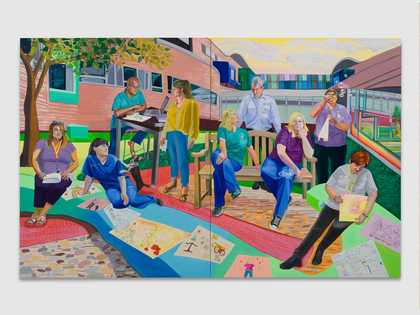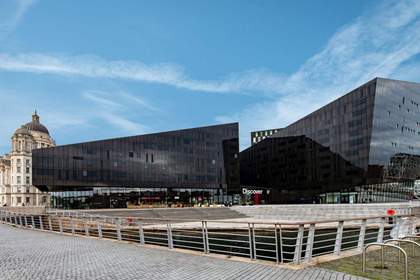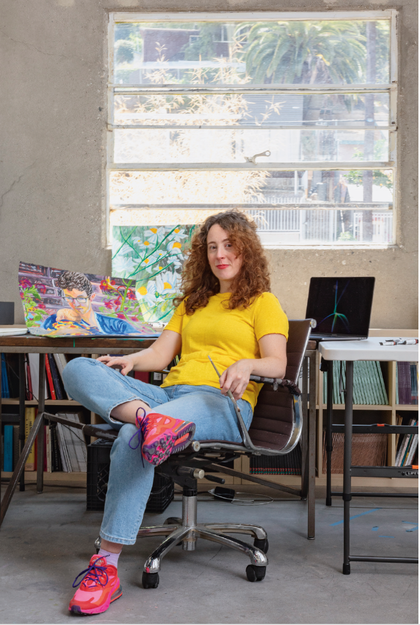
Aliza Nisenbaum in her studio in Los Angeles, August 2020, photographed by Joshua White
© Joshua White / JWPictures.com
From her studio in Los Angeles, the artist Aliza Nisenbaum is painting a diverse group of key workers in what might be Tate’s first Zoom-based commission. The sitters were chosen from an open call for volunteers in collaboration with Liverpool City Council, and include an entire team from the Emergency Department at Alder Hey Children’s Hospital, a professor who is part of the Scientific Advisory Group for Emergencies (SAGE), nurses – including one who goes rock climbing in her spare time – and a paediatrician who makes certificates of bravery for his young patients. Individual and group portraits of those selected will be exhibited at Tate Liverpool at the end of the year.
Nisenbaum typically spends hours talking with and painting her sitters. The resulting portraits are luminously colourful and nuanced, reflecting the close connection between artist and subject. ‘When I sit with somebody and I’m painting them from life, it’s like we’re calibrating our relationship to each other,’ she recently told Tate Etc. ‘It’s a very intimate process.’
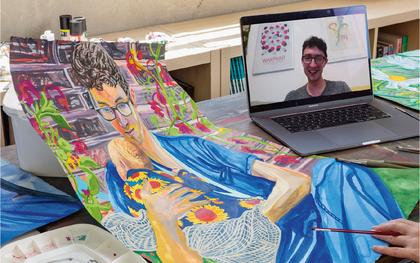
Key workers from Liverpool, including a respiratory doctor in training whose child was born during the pandemic, are sitting for their portraits with the artist over Zoom
© Joshua White / JWPictures.com
Nisenbaum had originally planned for her exhibition to centre on members of one of the city’s community allotments. With the outbreak of COVID-19, however, ‘things shifted dramatically’. As she explains: ‘I thought about how key workers, the people who were first responders during this pandemic, were very often the populations that I’ve been painting for a long time – often immigrant populations, often people that are seen as supposedly low-skilled workers, while they are actually absolutely essential to our economy. So I decided to shift the project towards those key workers and, after hearing their heroic stories, to make paintings of them.’
The pandemic not only refocused who the project’s participants would be, but also how it could be carried out. In her lockdown studio in Los Angeles (she is normally based in New York) Nisenbaum has adapted to the new means of communication by which people are assembling today. Far from seeing this as an obstacle, she believes it can provide an opportunity to forge deeper connections with her sitters. ‘Now I will be let into their homes. Before, they would come to my studio and I would paint them there. This also allows me to work with people that would not have had time to sit with me for four or five hours otherwise.’
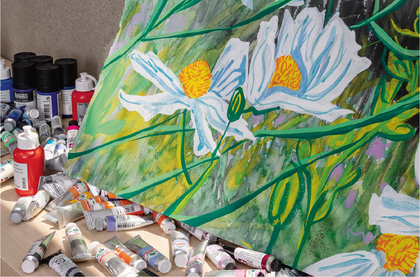
Inspired by her recent walks around Los Angeles, Nisenbaum has been painting flowers from her lockdown studio
© Joshua White / JWPictures.com
For Nisenbaum, ‘paying attention can be a political act’ and her hope is that these new paintings will allow us all to connect more deeply with the role that key workers have played during the pandemic: ‘It’s hard to empathise with numbers – like when you hear “X number of hospital workers have been working sleepless nights.” But when you actually see their faces, the lustre they have, I feel like that will humanise them.’
As with all of Nisenbaum’s exhibitions, the first people to see the show will be the people in the pictures. ‘I am just so excited for the key workers to go to Tate and see their portraits there, and see that be an outcome of this hard work that they have been doing.’ As to how the final paintings will be displayed, she is still grappling with ideas. Inspired by recent walks around her temporary home of Los Angeles, she has been making large paintings of flowers. ‘Perhaps I will pair them with the portraits,’ she tells us, ‘It would be like sending them flowers, like giving them a bouquet – an offering of some sort.’
Aliza Nisenbaum, Tate Liverpool, 15 December – 27 June 2021. Curated by Tamar Hemmes, Assistant Curator, Tate Liverpool. Supported by The Tate Liverpool Commissioning Circle, the Embassy of Mexico in the United Kingdom and the Mexican Agency for International Development Cooperation.
Aliza Nisenbaum talked to Enrico Tassi.

